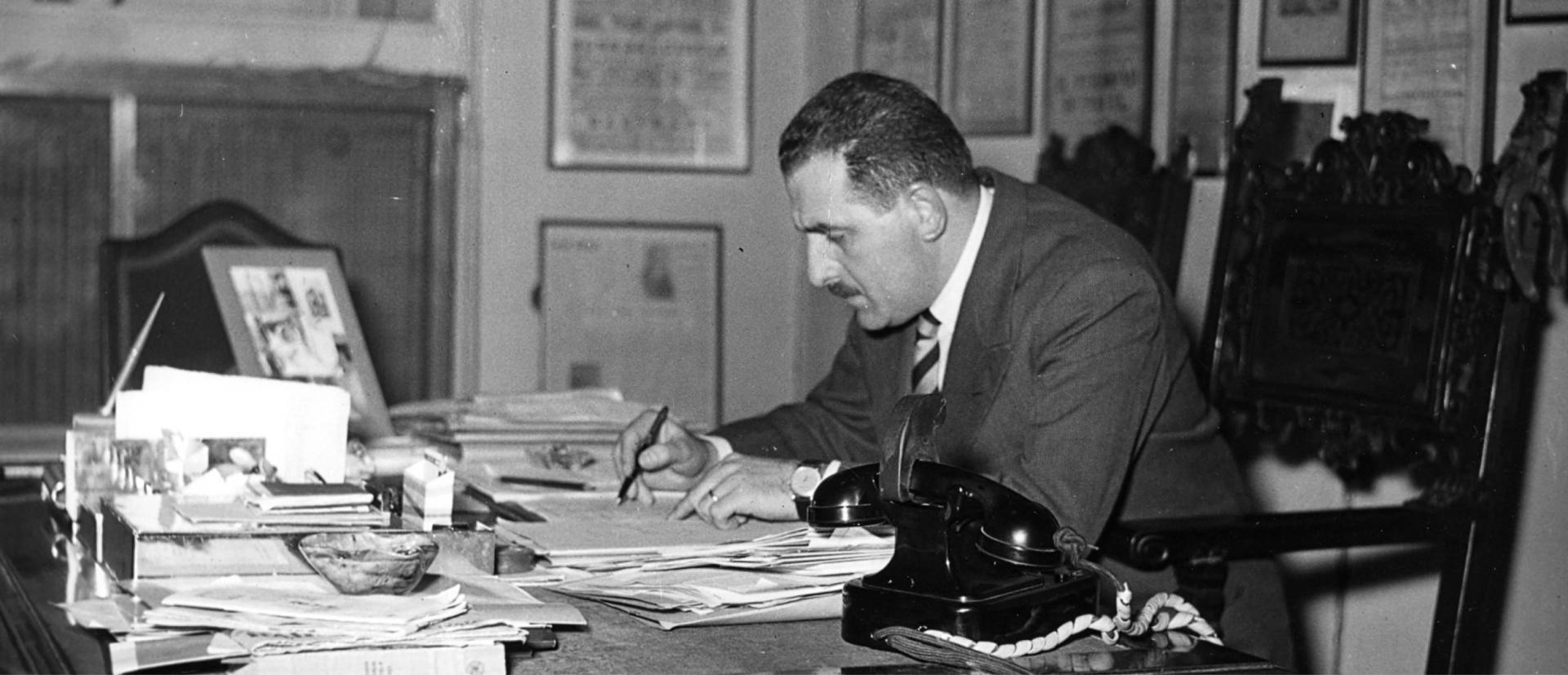
Paolo Grassi
Paolo Grassi was born in Milan on the 30th October 1919 into an Apulian family from Martina Franca. At a very young age, he nurtured a profound passion for the theatre. A student of the prestigious high school “Regio Liceo Ginnasio Giuseppe Parini”, at the age of eighteen he was appointed “vice critic” of the Milanese “Sole”, at the same time collaborating with youth magazines with articles and essays. In 1937, he started working in the theatre as a director, with the staging of the show Bertoldissimo. This was followed by his joining the retinue of the “Compagnia della Commedia”, directed by Gian Maria Cominetti. At this point, with determination and sacrifice, he began to consolidate his skills as a critic, essayist and theatre practitioner through a rigorous apprenticeship. 1940 saw him as the organiser of the company “Ninchi-Dori-Tumiati”, bringing Sem Benelli’s The Jesters’ Supper to the Italian stage; the following year he founded the avant-garde group “Palcoscenico”, with the actors Giorgio Strehler, Mario Feliciani and Franco Parenti. The ensemble presented many contemporary authors such as: Rebora, Treccani, Pirandello, O'Neill and Chekhov, aiming to bring radical innovation to the dramaturgy.
In December 1941, with the outbreak of war, Grassi was called up for military service. After having participated in the Resistance in the ranks of the socialist militancy, he returned to the theatre and to culture in 1944, directing the series of books on theatre published by Rosa & Ballo, and Poligono. From the Liberation of Italy until March 1947, Paolo Grassi was the theatre critic for “Avanti!”. It is during this period that he nurtured the idea of creating a publically managed repertory theatre.
It was therefore in 1947, alongside Giorgio Strehler, that he founded and directed the Piccolo Teatro della Città di Milano, the first repertory theatre and municipal entity for prose in Italy. The theatre was inaugurated on the 14th of May with a staging of Maxim Gorky’s The Lower Depths. This event signalled not only the birth of a new theatre but of an organisation which believed in the “social commitment, ethical conscience and civil maturity” of creating performances: an “Arts Theatre for All”.
Grassi held the post of director of the Piccolo for twenty-five years, until May 1972. The list of all the shows produced by the Piccolo Teatro during Strehler and Grassi’s partnership is very long. During this time, Grassi, tireless organizer that he was, accompanied the Milanese theatre around the world. Neither did he neglect the cultural and editorial production, working on “Collezione di Teatro”, a book series he managed along with Gerardo Guerrieri for Einaudi, as well as consistently on the book series “Documenti di Teatro”, with Giorgio Guazzotti, for the publishing house Cappelli.
In the post-war period Grassi identified and advocated the need for a radical renovation of the national theatrical structure, calling for the creation of municipal Theatres as public services, with a culturally elevated level of repertoire aimed principally at bringing the lower classes closer to the theatre. Sensitive to the needs of the City of Milan, in 1958 he contributed to the reopening of the Teatro Gerolamo, promoting its activity of experimental theatre and inviting the participation of artists from all over the world. His prime objective was to develop a process of adaption of Italian culture and theatre to a European level, and the Piccolo Teatro and Milan are naturally the example and the foundry of this tireless cultural endeavour.
Alongside the shows produced in the now historic venue of Via Rovello, he also reopened the Teatro Lirico to the great shows of prose, he invented the international festival “Milano Aperta” and he prompted the city to participate in a challenging operation of cultural decentralisation with the big tops of the Teatro Quartiere.
When, on the evening of 25 April 1972, Grassi announced that he was leaving the Piccolo, he left behind a legacy of 150 shows, 8000 performances, and 185 tours in the cities of thirty different countries, and by then the Piccolo had already established itself as the most important Italian theatre, internationally acclaimed.
In 1972, Grassi was appointed as the superintendent of La Scala. He began working with Massimo Bogiankino and Claudio Abbado towards the common aim of restoring La Scala to its maximum artistic level and of bringing the theatre once again closer to the city and to the Lombardy Region, through the development of a dialogue with the cultural sector, students and organisations. Amongst his many endeavours, he was also the first superintendent to forge relationships with the Soviet Union, Japan and North America.
In January 1977, he left Milan and moved to Rome, where he became the President of Rai-Tv, with a three year mandate that was not without controversy, due to his rigorous application of cultural principles. At the end of his tenure he was appointed as the President of Rai-Corporation, and later as the President of the publishing group Electa, where he passionately resumed his editorial activities.
Paolo Grassi was also a fundamental contributor to numerous cultural activities as both promoter and supporter. He was President of the Italian Section of the ITI (International Theatre Institute), President of the David di Donatello, Honorary President of the Premio Dino Ciani and member of the Italian Commission of UNESCO.
Over the years, he received numerous Italian and foreign honours for his artistic merits: Knight of the Great Cross of the Order of Merit of the Republic of Italy; la Legion d'Onore, l'Ordine Arts et Lettres e l'Ordre National du Merite, all awarded by the French Government, and the Grand Cross of the Order of Merit of the Federal Republic, conferred by the German government. He died on the night of 14 March 1981 at the age of 62, during heart surgery.